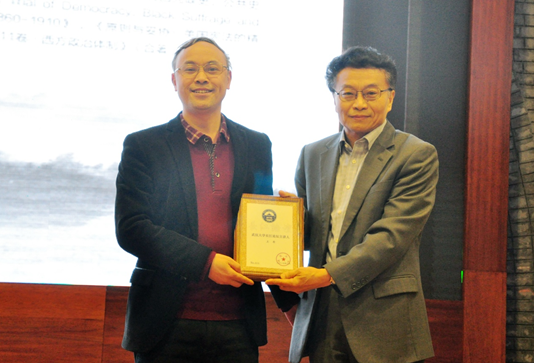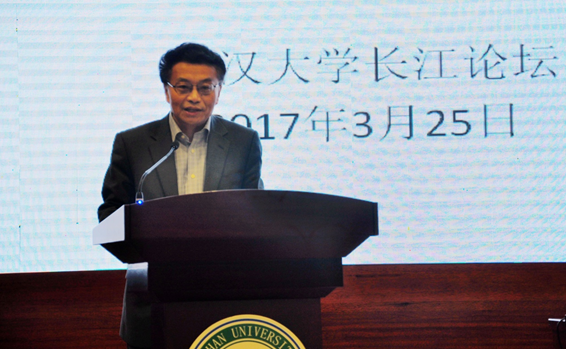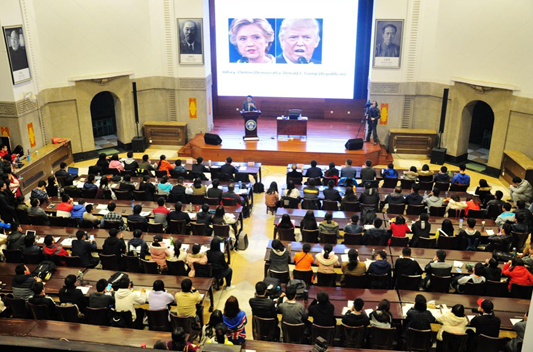Prof. Wang Xi from Indiana University of Pennsylvania, delivered a speech on democracy alienation---a review of the 2016 US election via a historical approach in the 15th Yangtze Lecture. Dean of the School of History, Prof. Liu Anzhi awarded Pro. Wang Xi the Yangtze Lecturer with a commemorative certificate. Prof. Liu Litang, Secretary of the History School Party Committee, hosted the lecture.

Prof. Liu Anzhi awarding Prof. Wang Xi the Yangtze Lecturer with a commemorative certificate
Prof. Wang started the lecture by introducing the House of Cards and the West Wing, and he compared the 2016 election to a political scene play. Then he asked the audience a tantalizing question: why a political extremism, Americanism and self-righteous candidate won the election? Prof. Wang answered this question from a historical perspective by analyzing the polarization of politics, the culture war, voter reconstruction and other factors that influenced the election.

Prof. Wang Xi started his lecture with examples from two popular TV series.
Prof. Wang said that according to Richard Hofstadter, except during the Cold War period, American leaders share a common value which facilitated the American solidarity and social stability, that is the ideological consensus. But Prof. Wang summarized another consensus, the institutional consensus, which offered an alternative governance opportunity for two parties, and guaranteed a relatively stable environment for American politics. But the 21st century witnessed new changes. On the one hand, both the ideological consensus and the institutional one are being extruded by political extremism; on the other hand, civil rights divided and dispersed after the Civil Rights Movement, and the voter mobilization weakened, hence people are losing their enthusiasm for voting. When Trump put forward his slogans (anti-pro-establishment camp, anti-elitism, anti-multiculturalism), he successfully got those voters’ support.
Prof. Wang analyzed that when the political realignment appeared after the Roosevelt’s New Deal in the 1930s, the Democratic Party became progressive and the Republicans conservative. After the Civil Rights Movements and Lyndon Johnson’s Great Society reform, multiculturalism became a mainstream value among American people with conservatism rising as well. The internationalization policies during Obama' tenure led to a deconstruction of voters, as these policies didn't bring real benefits to the working class especially in the central Rust Belt. Consequently, unprivileged people show their worries towards widespread poverty, and favor Donald Trump’s anti-internationalization policy.

The third reason for Trump’s victory, according to Prof. Wang, is the American society’s value division. The value disintegration towards immigrants, homosexual marriage, abortion, etc. led to the splitting of society; in another words, the 2016 election is a battleground for different values: multicultural liberalism vs. Americanism, elitism vs. populism, internationalism vs. national interests.
Prof. Wang Xi specializes in the political history of the 19th-century United States and gives lessons on the Civil War, Reconstruction and African American history; his seminars cover topics such as slavery, citizenship, constitutional history, and American state- and nation-building. He is the author of The Trial of Democracy: Black Suffrage and Northern Republicans, 1860–1910 (1997, 2012), Principles and Compromises: The Spirit and Practice of the American Constitution (in Chinese, 2000, exp. ed., 2005, 3rd ed., 2012), and Discovering History in America: Reflections of Chinese Historians in the United States (in Chinese, co-edited with Yao Ping, 2010). His book translations include Eric Foner’s The Story of American Freedom (2002, 2003, 2005) and Give Me Liberty: An American History (two volumes, 2010). Since 2003, he has been serving as editor of the Chinese Historical Review, a transnational journal of history published by U.K.-based Maney Publishing.
Photo by School of History
Edited by Liu Li, Edmund Wai Man Lai & Hu Sijia